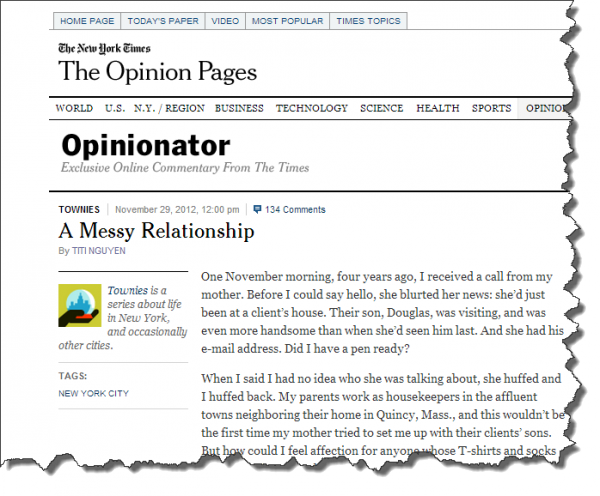by Leeland Lee
In a piece published online last Thursday in The New York Times entitled “A Messy Relationship,” Titi Nguyen describes her mother’s pivotal role in introducing her to her future significant other, a man by the name of Douglas. The narrative takes an intriguing turn because Nguyen’s parents both work as housekeepers for Douglas’s parents. Also discussed at great lengths is their age difference: Douglas is 16 years older than Nguyen, who is in her early 20s.
Midway through the article, we learn that race may have been a motivating factor behind the mother’s choice of Douglas. Nguyen writes:
“My mother’s reaction to our relationship was so enthusiastic that it roused my suspicions. I wondered if her excitement was linked to Douglas’s whiteness, his Americanness. Unlike most traditional Asian mothers, she encouraged me to date white men. Surely someone who grew up anchored in American culture would be more financially and socially assured…. She also believes that a white man will treasure me more than an Asian man, because I’m different from what he comes from.”
The timing of this article is unfortunate. 3,000 miles away, Asian students at UCLA were still recoiling from the insensitive “white worship” slurs discovered just one day earlier in a woman’s bathroom stall. But even independent of these hate crimes, I felt disheartened after reading Nguyen’s anecdote. Although it is unlikely that she shares her mother’s extreme outlook, she conveys a sense of implied acquiescence by not denouncing her mother’s negative opinion of Asian men. Instead, she writes later, “In bed, my eyes trace the blue veins shooting through the milk of [Douglas’s] skin, like eggshell cracks…. I’m fascinated by the differences between his body and mine.”
There are enough interesting contrasts between Nguyen and Douglas that I began to wonder whether it was really necessary for her to bring race into the mix. In my opinion, her captivating anecdote would not have suffered. More importantly, I began to wonder whether our society lends an institutionalized blind eye to her mother’s offensive opinions regarding Asian men—just as long as these sentiments are attributed to someone else and surrounded by sparkling prose?
As we learned from last week’s hurtful hate crimes, Asian women face difficult challenges in today’s society. But let us not forget that Asian men are also suffering. When any anti-Asian opinions are expressed and seemingly condoned in public—in this case, in no less than our nation’s Newspaper of Record—I feel this does a great disservice to our culture. After reading the sentiments expressed by Nguyen’s mother, I honestly felt somewhat embarrassed for my race.
In the end, I wish Nguyen and Douglas the best of luck with their future together. Given their age and socio-economic differences, even she acknowledges that their relationship faces an uphill struggle. Then again, miracles do happen.
ABOUT THE AUTHOR: Leeland has previously written about the media’s portrayal of Asian males for 8asians.com









